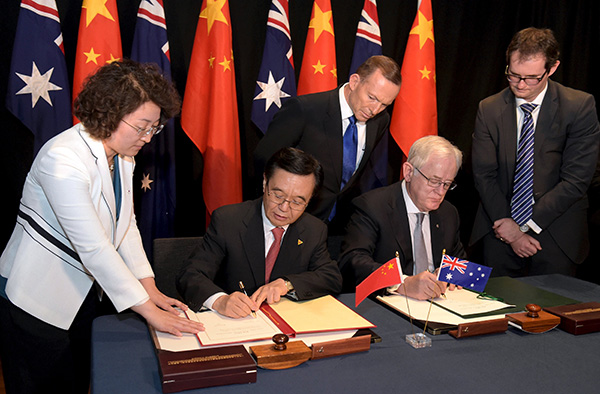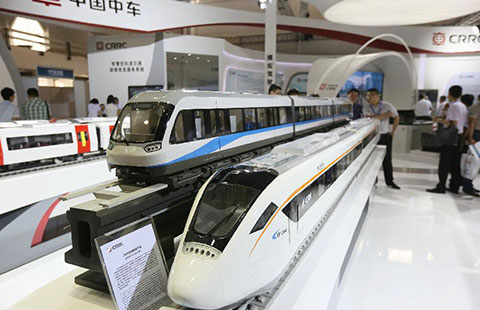China, Australia sign free trade agreement
By Zhong Nan (chinadaily.com.cn) Updated: 2015-06-17 10:22
 |
|
Australian Prime Minister Tony Abbott (C) watches as China's Minister of Commerce Gao Hucheng (2nd L) and Australian Minister for Trade Andrew Robb (2nd R) sign a trade agreement during an official signing ceremony in Canberra June 17, 2015. [Photo / Agencies] |
China and Australia signed a free trade agreement on Wednesday after a decade of negotiations, covering areas including a simplified review procedure for investments, most-favored-nation status and easier market access to service sector.
Under the agreement, 85.4 percent of goods traded between both sides will cut tariffs to zero immediately. About 97 percent of Australian exports to China will be tariff free following the designed timeline step by step. There will include many agricultural products such as beef, dairy and wine. Australia will eventually reduce tariffs to zero on all goods imported from China.
China's major exports to Australia are machinery, telecommunication equipment, computer, furniture and garment product, and its main import from Australia are iron ore, coal, gold, copper, education-related travel services and agricultural products, according to the Customs data.
Official figures show trade volumes between China and Australia jumped from $88.1 billion in 2010 to $136.9 billion in 2014. Australia had $9.4 billion trade surplus with China last year.
Australia's service businesses, such as education, tourism, telecommunications, healthcare and financial services, will gain more market access into China, either by partnering up with Chinese companies, or in certain situations being able to access those markets directly.
Private Chinese investment under $830,000 will not be subject to the approval of Australia's Foreign Investment Review Board. There also will be an Investor State Dispute Settlement mechanism under the agreement.
China was Australia's largest export market for both goods and services in 2014, accounting for nearly a third of total exports, and a growing source of foreign investment.
Eager to seek more new market growth points with close trade partners together, China also signed its largest bilateral free trade agreement in terms of volume with South Korea earlier this month.
Under the deal, China will remove tariffs on 91 percent of all products from South Korea within the next 20 years, while Seoul will eliminate tariffs on 92 percent of all goods in the other direction.
FTA signals new era in trade ties
The China-Australia Free Trade Agreement (FTA), agreed upon by President Xi Jinping and Australian Prime Minister Tony Abbott last November, is set to start a new era in trade ties between the two countries.
Under the FTA, Australia will eventually reduce tariffs to zero on all goods imported from China, and China will remove tariffs on the vast majority of Australian goods. It will also include opening-up of numerous service sectors, a simplified review procedure for investments, most-favored-nation treatment, favorable market access rules and market transparency.
- Investment spending to get big boost
- Chinese become biggest foreign buyers of US real estate
- Nation's commuters skip taxis as Uber lures with free rides
- Fall in Japanese investment 'set to continue'
- Top 5 wealthiest women in technology
- Huawei committed to UK expansion
- China streamlines business registration to encourage startups
- China to cooperate with IMF in yuan's SDR review

















